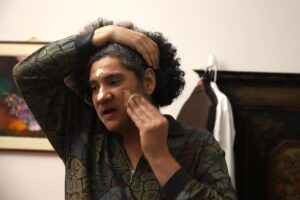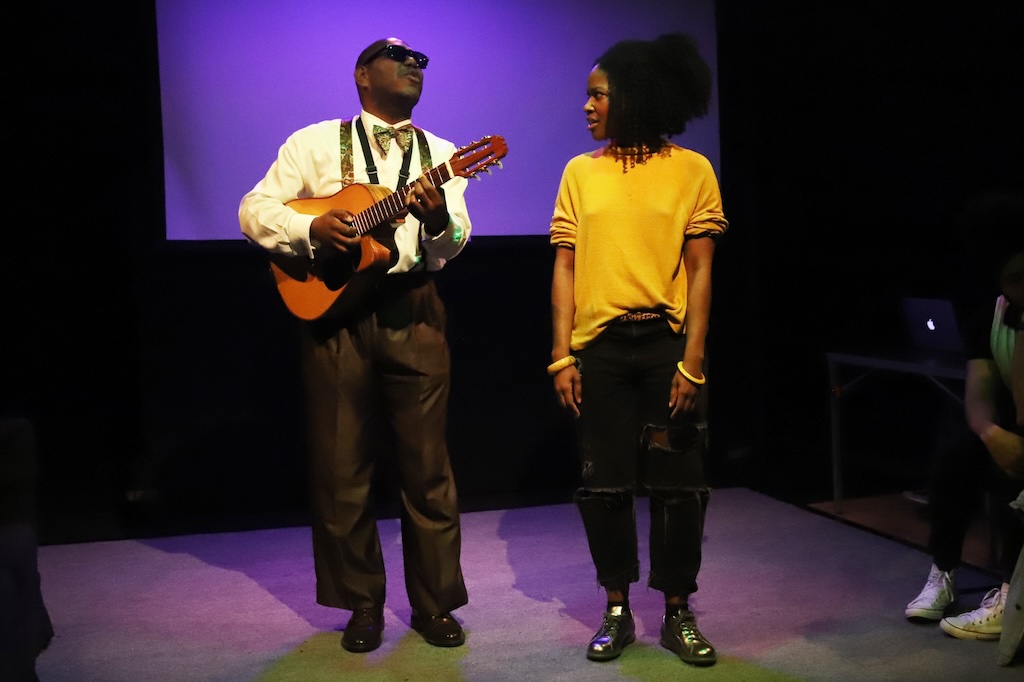When the lights go down in the ID Studio Theater, both actors and audience are ready to step into the history of salsa music and the blind Afro-Cuban composer who helped shape its signature sound.
“Arsenio,” a play in Spanish and English, debuted Feb. 15 and has since extended its Mott Haven run thanks to popular demand through March 17. It traces the history of one of the borough’s most celebrated musical styles and tells the story of musician Arsenio Rodriguez, who lived in Longwood after emigrating from his native Cuba.
“It’s very important that ‘Arsenio’ happened,” said Sandie Luna, executive director of the company, which is headquartered at 311 East 140th Street. “Arsenio Rodriguez was in The Bronx, he wrote about The Bronx, he was an Afro-Latino proud of his African roots.”
His story also fills a gap in the theater world, which needs more Afro-Latino representation, said Luna.
“It needs to be done in an authentic way that respects equality and differences. This is a way to continue to explore how we can represent the community and embody their realities,” she said.
ID Studio Theater opens its doors Thursday through Sunday for “Arsenio,” which is the last chapter of the “Between Two Worlds” trilogy co-directed by Germán Jaramillo and Leyma López. The trilogy explores stories and identities through Latin American music. In “Arsenio,” three characters on the stage create a world full of mysticism, stories, and, above all, good Cuban music.
“Arsenio” is a tribute to the life and music of the Afro-Cuban composer also known as “The Wonderful Blind Man.” Rodriguez, who lost his sight as a child after he was kicked in the head by a horse, arrived in New York in the 1940s. He developed various musical styles such as son and rumba, which became the precursor of salsa.
The play tells the story of Yenifer, a young girl full of insecurities who wants to be a musician. Rodriguez, who died in 1970, appears to guide her in pursuit of her dream.
“I tried to be very careful that the character was not a caricature of Arsenio,” said Colombian actor Manuel Francisco Viveros, 45, who steps into the musician’s skin.

Viveros began researching the Cuban composer’s life last year and rediscovered his music.
“For some reason, it was easy for me to understand Arsenio’s life. It was very interesting,” he said.
One of the biggest challenges for Viveros is to perform the entire play with his eyes closed, as a blind man.
“I feel like I don’t act the play, I listen to it,” Viveros said. “The most interesting thing is that I don’t see anything, but I know where I’m standing. It takes me to a very particular level of concentration. Acting with my eyes closed has helped me to understand this profession from another perspective. And I think that’s a gift from Arsenio.”
Leah Young, who acts in the role of Yenifer, said the play has been a way of finding herself, as well.
“I also have moments when I doubt my abilities and my talents,” said Young.
Her goal is to take away “Leah, my worries and my ego, and make myself available to Yenifer’s situation,” she said.

The third character in the play is Mundo, who belongs to the world of saints and ancestors. For Humberto Pernett, the Colombian actor who gives life to this character, “Arsenio” has been an opportunity to delve into magic.
“I have also seen people who after seeing the play have been reunited with their essence, with their ancestors, with Arsenio’s music,” said Pernett. “That’s what art is all about. I love that people leave with a beautiful experience. Art always has to revolutionize, to do something inside your heart.”
ID Studio Theater, a non-profit organization that has been staging works for the South Bronx and the larger Bronx community since 2001, said the public reception has been overwhelmingly positive.
Luna said the theater reaches a diverse audience, including children and other people, and it hopes to attract more young people. ID Studio Theater is also hoping to reach more potential audience members from immigrant and working-class backgrounds.
“Our immigrant community, who are working, don’t necessarily think there is a theater for them, because in this city theater tends to be almost a luxury, because of the cost,” she said.
ID Studio Theater plays are free, although donations are accepted, she said. The organization focuses on works that are rooted in the migrant experience, but with a perspective that celebrates, explores and educates people about that reality – like “Arsenio,” she said.

